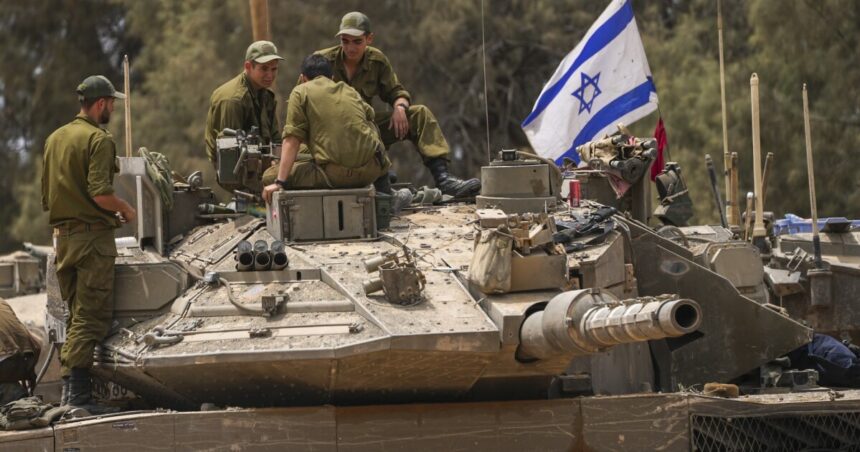Israel’s military stated on Wednesday that it had taken control of a vital corridor along Gaza’s border with Egypt in order to disrupt smuggling tunnels as part of its efforts to dismantle the militant Hamas group in an ongoing war that has lasted for eight months.
The seizure of the Philadelphi Corridor may complicate Israel’s relationship with Egypt, which has voiced concerns about Israel’s advancement towards its border. Israel claims that the corridor is rife with tunnels that have been used to smuggle weapons and other goods for Hamas, despite the blockade imposed by Israel and Egypt for years.
Israel has also intensified its presence in the southern Gaza city of Rafah, where many residents have sought refuge from the conflict. The escalating violence in recent days has resulted in the deaths of numerous Palestinians. The military reported that a fifth brigade, consisting of several thousand soldiers, joined the operation in the city on Tuesday.
Egypt has expressed opposition to any increase in troops in the strategic border area as it would violate the 1979 peace agreement between the two countries. Egypt has also raised objections to Israel taking control of the Rafah border crossing, which is the only crossing between Gaza and Egypt.
“The Philadelphi Corridor served as the oxygen line of Hamas through which Hamas carried out weapons smuggling into Gaza on a regular basis,” stated Israel’s military chief spokesperson, Rear Adm. Daniel Hagari.
According to an Israeli military official, Israel informed Egypt of the takeover, where they discovered around 20 tunnels, including some previously unknown to Israel, as well as 82 access points to the tunnels. The official mentioned that it was unclear if the tunnels were currently in use.
Politics
Nikki Haley writes ‘Finish them!’ on Israeli artillery days after Rafah strike
5:14 PM, May 29, 2024
The corridor is a part of a larger demilitarized zone along the entire Israel-Egypt border. According to the peace agreement, each side is permitted to deploy only a small number of troops or border guards in the zone, with the option to modify these numbers through mutual agreement.
Egypt’s state-run Al-Qahera News TV reported that there were no communications with the Israeli side regarding the allegations of finding tunnels on the border. Egypt has repeatedly raised concerns that the Israeli offensive could lead to Palestinians crossing the border, which Egypt deems unacceptable.
The narrow corridor, approximately 100 meters wide in certain sections, runs along the 8.6-mile length of the Gaza side of the border with Egypt and includes the Rafah crossing into Egypt.
Hamas has had unrestricted access to the border since taking control of Gaza in 2007.
Smuggling tunnels were constructed beneath the Gaza-Egypt border to bypass the blockade imposed after Hamas seized power. Some of these tunnels were large enough to allow vehicles to pass through. Hamas used these tunnels to bring in weapons and other supplies, while Gaza residents smuggled in various goods, from livestock to construction materials.
Over the past decade, Egypt has taken action against these tunnels as it combated Islamic militants in Sinai. The Egyptian military has destroyed hundreds of tunnels.
The Israeli military official also noted that Israel has gained “tactical control” of Tel al-Sultan, a neighborhood on the northwest edge of Rafah. However, he mentioned that the operation in the city remains limited in scope and scale.
John Kirby, the White House national security spokesman, stated that the seizure of the Philadelphi Corridor aligns with the “limited” ground operation briefed by Israeli officials to President Joe Biden’s team for Rafah.
Meanwhile, the violence persists, with the Gaza Health Ministry reporting that two ambulance crew members were killed in an apparent Israeli strike while on their way to evacuate casualties in Tel al-Sultan.
Further, a senior Israeli official indicated that the war is projected to continue until the end of the year, indicating a prolonged conflict that has led to significant casualties and consequences for both sides.
Israel’s national security adviser, Tzachi Hanegbi, shared his expectation of “another seven months of fighting” to dismantle Hamas and the Islamic Jihad militant group. The prospects for Gaza’s future and Israel’s role in it remain uncertain as the conflict persists.
The war has had devastating effects on Gaza’s population and infrastructure, prompting international intervention and legal scrutiny of Israel’s actions. The continuing conflict poses challenges for Israel’s leadership and raises concerns about the region’s stability.
Despite ongoing efforts, Israel has yet to achieve its main objectives in the conflict, leaving the situation in Gaza unresolved and the potential for future engagements.
These developments underscore the complexity and gravity of the conflict in the region as both sides continue their efforts to secure their objectives and safeguard their interests amidst ongoing hostilities.





